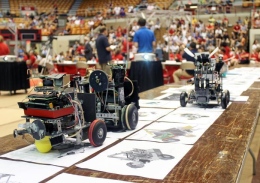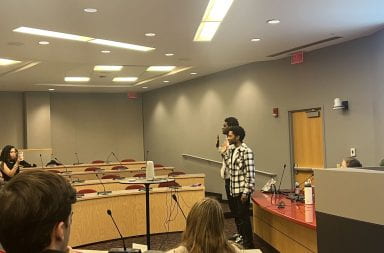Many recent Ohio State graduates will soon turn their attention toward repaying student loans, but some of them may have less to worry about than others.
Graduates of Ohio State’s College of Engineering have been listed among the highest paid in the nation by NerdWallet, a financial comparison company.
The $59,468 average salary of OSU’s College of Engineering graduates ranks No. 22 on a list of 25 various schools with the reported highest salaries upon graduation. The college ranks one notch above University of Michigan’s Ross School of Business, the only other Big Ten representative. Graduates of Ross School of Business earn an average salary of $59,432.
David Williams, dean of the College of Engineering, said the program’s structure makes the college stand out from others and is likely what lands its graduates well-paying jobs.
“All of our engineering students get hands-on education from the moment they start their freshman year,” Williams said. “Nobody does experiential education, on the contrary. We’re recognized as one of the leaders in that area and I think it’s the scale on which we do it that sets us apart.”
Williams said the College of Engineering offers hands-on education to about 1,700 first-year students in multiple forms including annual robot and nanotech competitions.
David Wright, a second-year in computer science and engineering, was a programmer on the four-person team that won the college’s 2012 robot competition. He said the experience has since proven beneficial for résumés and helped him earn a summer internship at Johns Hopkins University Applied Physics Laboratory.
“I personally gained project experience that I could talk about in interviews, experience working with a very open set of guidelines that let (my team and I) go through the problem-solving method ourselves,” Wright said. “That was a big talking point for me in interviews for engineering internships, that I went through the problem-solving method like they do in the industry.”
The experiential education, however, isn’t limited to participation in competitions.
Wright said that prior to contests, students are exposed to hands-on projects in different areas of engineering before committing to a specific discipline.
“Leading up to the competition, they have labs that introduce you to various disciplines … to help you decide if you picked the right one,” he said. “Like you’ll have a lab beforehand in aerodynamics, so you can see if aeronautical engineering is the way you want to go.”
Ryan Brady, a second-year in aerospace engineering, also feels the hands-on education benefits his engineering peers, but because of its difficulty.
“Getting a job is one thing, but actually performing well at your job is another thing,” Brady said. “When they give you that hard of work, it prepares you well for jobs and makes you a success in the workforce.”
Brady said the coursework he completed during his first year, in the engineering program specifically, set the pace for the 2012-2013 academic year.
“I’m into my major coursework, and I’m not going to say it’s easier, just less time consuming,” he said. “It’s harder work, but it forces you to stay on top of the game.”
While Williams said he is happy with the success of his program so far, he also said the College of Engineering will continue to strive to stay ahead of the curve in coming years.
“We constantly revise our curriculum,” Williams said. “Employers tell us that they would like some of our students to have a more in-depth knowledge of business when they graduate, so we’re putting more emphasis on that. It’s a constant thing we do. Even if a course has the same name from five years ago, the content may be very different.”



